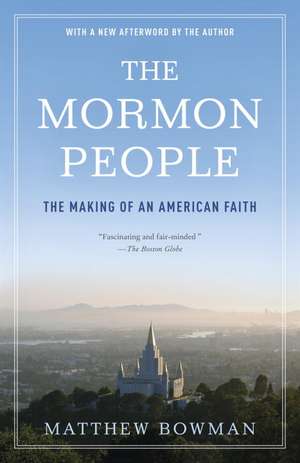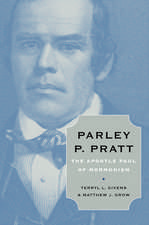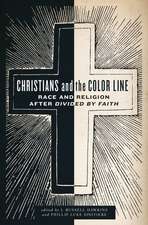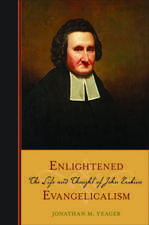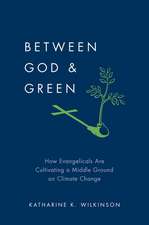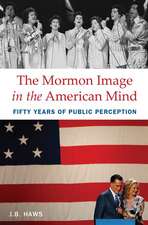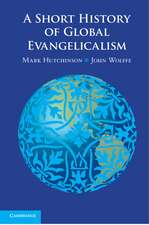The Mormon People: The Making of an American Faith
Autor Matthew Bowmanen Limba Engleză Paperback – 27 aug 2012
With Mormonism on the nation’s radar as never before, religious historian Matthew Bowman has written an essential book that pulls back the curtain on more than 180 years of Mormon history and doctrine. He recounts the church’s origins and explains how the Mormon vision has evolved—and with it the esteem in which Mormons have been held in the eyes of their countrymen. Admired on the one hand as hardworking paragons of family values, Mormons have also been derided as oddballs and persecuted as polygamists, heretics, and zealots. The place of Mormonism in public life continues to generate heated debate, yet the faith has never been more popular. One of the fastest-growing religions in the world, it retains an uneasy sense of its relationship with the main line of American culture.
Mormons will surely play an even greater role in American civic life in the years ahead. The Mormon People comes as a vital addition to the corpus of American religious history—a frank and balanced demystification of a faith that remains a mystery for many.
“Fascinating and fair-minded . . . a sweeping soup-to-nuts primer on Mormonism.”—The Boston Globe
“A cogent, judicious, and important account of a faith that has been an important element in American history but remained surprisingly misunderstood.”—Michael Beschloss
“A thorough, stimulating rendering of the Mormon past and present.”—Kirkus Reviews
“[A] smart, lucid history.”—Tom Brokaw
Preț: 130.83 lei
Nou
Puncte Express: 196
Preț estimativ în valută:
25.03€ • 26.14$ • 20.72£
25.03€ • 26.14$ • 20.72£
Carte disponibilă
Livrare economică 15-29 martie
Preluare comenzi: 021 569.72.76
Specificații
ISBN-13: 9780812983364
ISBN-10: 081298336X
Pagini: 336
Dimensiuni: 130 x 201 x 25 mm
Greutate: 0.32 kg
Editura: Random House Trade
ISBN-10: 081298336X
Pagini: 336
Dimensiuni: 130 x 201 x 25 mm
Greutate: 0.32 kg
Editura: Random House Trade
Recenzii
Advance praise for The Mormon People
“The Mormon church has never been more important in American politics. In this smart, lucid history of the faith, Matthew Bowman explains a religion that many Americans don’t understand but should. With Mitt Romney and Jon Huntsman in the race, this is essential reading for anyone interested in 2012 and beyond.”—Tom Brokaw, author of The Time of Our Lives: A Conversation About America
“Matthew Bowman has brought us a cogent, judicious, and important account of a faith that has been an important element in American history but remained surprisingly misunderstood.”—Michael Beschloss, author of Presidential Courage: Brave Leaders and How They Changed America, 1789ߝ1989
“What do Mormons stand for? Are they quintessential good citizens or troubling religious deviants? Why are Mormons running for president? Matthew Bowman offers a quick, lively, and informative trip into the heart of Mormonism. All who are concerned or just curious will learn a lot about the making of modern Mormons from this book.”—Richard Lyman Bushman, author of Joseph Smith: Rough Stone Rolling
From the Hardcover edition.
“The Mormon church has never been more important in American politics. In this smart, lucid history of the faith, Matthew Bowman explains a religion that many Americans don’t understand but should. With Mitt Romney and Jon Huntsman in the race, this is essential reading for anyone interested in 2012 and beyond.”—Tom Brokaw, author of The Time of Our Lives: A Conversation About America
“Matthew Bowman has brought us a cogent, judicious, and important account of a faith that has been an important element in American history but remained surprisingly misunderstood.”—Michael Beschloss, author of Presidential Courage: Brave Leaders and How They Changed America, 1789ߝ1989
“What do Mormons stand for? Are they quintessential good citizens or troubling religious deviants? Why are Mormons running for president? Matthew Bowman offers a quick, lively, and informative trip into the heart of Mormonism. All who are concerned or just curious will learn a lot about the making of modern Mormons from this book.”—Richard Lyman Bushman, author of Joseph Smith: Rough Stone Rolling
From the Hardcover edition.
Notă biografică
Matthew Bowman received his Ph.D. in American religious history from Georgetown University in May 2011, and a master’s in American history from the University of Utah. His dissertation, “The Urban Pulpit: Evangelicals and the City in New York, 1880ߝ1930,” was funded by the prestigious Charlotte W. Newcombe Doctoral Dissertation Fellowship. His work on American evangelicism and Mormonism has appeared in, among other places, Religion and American Culture: A Journal of Interpretation, Journal of the Early Republic, and The New Republic. The associate editor of Dialogue: A Journal of Mormon Thought, Matthew Bowman teaches at Hampden-Sydney College.
Extras
ONE
Joseph Smith and the First Mormons
To 1831
On a Monday morning in November 1835 a slender man in his middle forties, curiously dressed in a sea-green coat and pants and sporting a curling grey beard, picked his way into the muddy frontier town of Kirtland, Ohio, twenty miles northeast of Cleveland along the Chagrin River. He had come from New York City to visit Joseph Smith, Jr.: a national curiosity, twenty-nine years old, a self-declared prophet of God and leader of a people most often called the Mormons. Shortly after ten in the morning, Joseph's visitor found the prophet in his home in a row of cabins that lined a dirt road for perhaps a mile as it wound up a hillside from the river and toward an impressively large, if still incomplete, sandstone and lumber hall. The Mormons were building a temple, and the man, who rather evasively identified himself only as "Joshua the Jewish minister," must have gazed on it with awe and perhaps a little bit of envy. Joseph Smith, rarely humble, could not resist his visitor's apparent desire to discuss religion. The two spent the afternoon and evening together. Joseph told his visitor of his own visions of God, of the angel Moroni that had given him charge of golden plates that bore an ancient Christian scripture, and of his divine mandate to restore the Biblical church of Christ to the earth.
Joseph's scribe reported that the visitor seemed "highly entertained" at these stories, and well might he have been. After preaching to the prophet and some other Mormons on the impending degradation and collapse of American society, which he likened to the satanic Babylon of scripture, the man confirmed that he was in fact Robert Matthews, infamous in the press as "the Prophet Matthias." He claimed to be a true Israelite, the New Testament apostle Matthias reborn, divinely ordained to the "priestly" office that the Biblical name Joshua, with its echo of Mount Sinai and the Exodus, implied, and the embodied "spirit of truth." Three years earlier, Matthews had converted a handful of well-off New Yorkers, rearranged their marriages, squandered their money, introduced a version of Jewish dietary codes, and prophesied that his child would be the Messiah. His small urban kingdom had crashed to the ground when he was indicted for the murder of one of his followers. Though not convicted of that crime, Matthews served several months for beating his daughter and for contempt of court, as he routinely shouted and preached during his trial. When he surveyed the town of Kirtland several months after his release, friendless and destitute, Matthews no doubt envied the younger prophet. Joseph Smith had produced scripture and attracted hundreds of followers, and his temple was rising yards from his front door. The town of Kirtland had itself become a projection of his vision and his will. Matthews came as a supplicant.
Despite their differences, the two prophets sprang from similar cultures and impulses. The young American nation fostered prophets. Life in the early republic was quite different from that of the small kingdoms of the British emigrants who had settled the land a century and a half before. The Puritans had dreamed of spiritually united communities in which both church and state served the righteous desires of God's elect, a society orderly, regular, and clear-eyed in its devotions. But two centuries after the first Puritans had waded to the shores of Massachusetts, the vision had come unraveled. The surge of individualism that followed the American Revolution and the Constitution's disestablishment of religion upset the old structures of authority. Such excitement for the experiment in self-government joined with a booming market economy growing through the eighteen century to produce a peculiar democratic tide washed over the culture, society, and industry of early-nineteenth-century America. It offered Americans the opportunity to master their own lives rather than subordinate themselves to the collective. It trained them in individualism, in self-reliance, in risk-taking, and in the pursuit of opportunity. It fostered respect for refinement, for culture, for economic success. It taught that these qualities would come through rectitude, discipline, and hard work, and its way of life spread across the nation.
The prophets were children of this age. Their grand religious experiments were possible only in the chaotic freedom of the time. But each man in Kirtland that November morning longed for a cosmos ordered in ways far more permanent than the ceaseless whirl of democracy and trade seemed capable of offering, and each seemed to find such rest in marriage, family, and community. They preached salvation, the coming millennium, the great judgment of Christ on the chaos of their time, and they warned that only in their own ranks could salvation be found.
When Matthews claimed to be the product of reincarnation, Joseph Smith decided he had heard enough; he accused the older man of being possessed of a devil and cast him from Kirtland. Today, nearly two hundred years after their meeting, Robert Matthews lies buried and forgotten; even the date of his death remains uncertain.
Joseph Smith's grave, however, has become a pilgrimage site, his name recited and blessed in sermon and testimony by millions, the scripture he spoke and the rituals he taught cherished across the globe as the true and ordained way to God. His triumph sprang in part from the force and creativity of his religious imagination, his unswerving faith in his own capacities as a conduit for divine revelation, and his will to see his dreams made reality. But it grew also from the vision and dedication of those who chose to follow him: those who accepted and interpreted his ideas, who built in wood and stone the cities he saw in vision, and who, most of all, embodied in a holy community the divine experiences he craved. Men such as Joseph and the prophet Matthias were often assailed for theocracy, for rejecting democracy and establishing religious tyranny. But Mormonism was the construction of Joseph Smith's followers as much as of himself. It was a sacramental community bound together through ritual, priesthood, and ordinance, and his people became the society of which Joseph had dreamed: a firm rock in an unreliable world, a faithful community that itself became, in a way, the salvation its followers sought.
In 1816 Joseph Smith, Sr., and his wife, Lucy Mack Smith, gathered their children, including ten-year-old Joseph Jr., and left their home in Vermont to chase opportunity west. They were part of a New England exodus across the Great Lakes region in the eighteenth and early nineteenth centuries, children of the decaying utopia of Puritan New England following paths since wrenched askew from those of their ancestors. There had been Smiths in Massachusetts and Macks in Connecticut since the seventeenth century, farmers and small merchants, though by the generation of Joseph and Lucy both families seemed interested in trying something new. Joseph Sr.'s father, Asael, took his family from urban Massachusetts to eighty-three acres of raw land in Tunbridge, Vermont, in 1791, while Lucy's father, Solomon Mack, and brother Stephen found prosperity as merchants in the burgeoning towns of Vermont. When Lucy and Joseph were wed, they received its fruits: part ownership of the farm from Asael and a thousand dollars for Lucy from Stephen.
Though Vermont might once have been isolated, in the first years of the nineteenth century the arteries of trade had reached its mountains: a weekly stage line to Boston in 1801, a canal reaching Connecticut a year later. The pulse of commerce began to move back and forth, and Joseph Smith, Sr., sought to ride it. He bought a host of goods on credit from Boston and opened a small general store in Tunbridge. For a time he was successful, enough so that in 1803 he banked his career on ginseng, an herb whose popularity in China was making American merchants rich. But when the ship that carried Joseph Sr.'s investment in the East returned, word that his shipment had earned only the price of a case of tea came with it. Outraged, Stephen Mack hunted down a merchant who admitted that he had stolen Joseph's due before fleeing to Canada. Joseph Sr. was left with nothing but debt to his Boston creditors, and he and Lucy sacrificed their wedding gifts to pay it: Joseph sold his share of the farm, and Lucy surrendered the thousand dollars of her dowry.
Joseph Smith, Sr., had glimpsed the fantastic possibilities this new society offered-he, the son of a farmer, trading with such an exotic locale as China, growing wealthy because of his acumen and confidence. But through no fault of his own, save perhaps desire and ambition, he instead fell through its cracks. The Smiths sank from the respectable upwardly mobile middle class into which Joseph and Lucy were born to the desperate lives of tenant farmers. Economic insecurity and social anxiety would plague them and their children for the rest of their lives. As Lucy stiffly described the choice to pay off her husband's debt, "This was considerable of a trial to us for it deprived us at once not only of the comforts and conveiniences of life but also of a home of any discription." It was a bitter lesson that Joseph's children would have to learn vicariously, for the oldest living, Alvin, was barely five, with a younger brother, Hyrum, and an infant sister, Sophronia. The Smith child who worked hardest to overturn the systems of the world his parents struggled with, Joseph Jr., would not be born for another two years.
For a dozen years following the disaster, the Smith family drifted from farm to farm, from state to state. They lived in New Hampshire, Vermont, and Connecticut. Joseph Sr. worked variously as a schoolteacher, a day laborer, and a tenant farmer, cultivating land rented from other men. And they had more children: four sons, and another daughter. The oldest of these, born on December 23, 1805, was named Joseph Jr. He entered the world in a small cabin on a cold, windswept hill in Sharon, Vermont, on land rented from Lucy's father. A hundred years later, a group of well-dressed Mormons would travel there by train to erect a granite monument to the boy's life, but before he was two years old his ragged family left Sharon carrying their possessions on their backs, doggedly pursuing a stability that would never come.
Later, in her memoirs, Lucy devoted an entire chapter to her son Joseph Jr.'s bout with typhoid in 1813. The Smiths were then in New Hampshire, and the disease had killed thousands all across New England that year. Young Hyrum brought it home from his school, and the Smith parents prayed hand in hand through the night at the bedsides of their children who fell ill and recovered in turn. Just as the exhaustion and fear had passed, seven-year-old Joseph, seemingly recovered, complained of pain in his armpit and leg. Infection had set in. He was bled and lanced, but the disease had crept into his bone. Lucy recalled Hyrum sitting for hours with his brother's leg in his hands, applying pressure that allowed Joseph to sleep, and when doctors recommended that Joseph's leg be amputated, she refused to allow them into the boy's room. They instead agreed to peel back the flesh and chip away the diseased bone, which came off in three large chunks. As Lucy told the story, her seven-year-old son exhibited preternatural poise and compassion, ordering his mother to leave the room rather than to see her child in such pain and declaring that he would take no alcohol to numb his senses but instead should be held in the steady embrace of his father, who, he insisted, could "stand it" when his son screamed in his arms. And Joseph Sr., white-faced, did just that, while his wife agonized on the stoop, clinging to her son's declaration that "The Lord will help me, and I shall get through with it."
Lucy's memories taught her readers of the Smith family religion. Neither she nor her husband was a member of any church, but this was not due to lack of faith or longing. The Smiths had a strong sense of the power of God's providence in their lives, and they measured it by the strong bonds that held the family together. Her son's prodigious spiritual insights and firm confidence in God's will was to Lucy an example to them all. She explained that during Joseph's recovery "we felt to acknowledge the hand of God, more in preserving our lives through such a tremendous scene of affliction, than if we had, during this time, seen nothing but health and prosperity." Lucy's mother, Lydia, a dutiful Congregationalist, had imparted to her daughter her stern piety: Lucy passionately prayed and studied scripture throughout her life and taught her children to do so as well. She was firmly convinced that direct appeals to God had saved various family members from a plague of consumption in her youth. While herself deathly ill several years into her marriage she pled that God would "let me live, if I am faithful to the promise which I made to him, to be a comfort to my mother, my husband, and my children." Upon recovery she sought and found a minister who would baptize her without a subsequent obligation to join any congregation: though she longed for guidance and instruction, her church was her family.
She found her husband to be like her a seeker, but somewhat less orthodox. Joseph Sr.'s father, Asael, had abandoned Congregationalism for Universalism, the doctrine that Christ's crucifixion saved all humanity, without exception. To Calvinists this was heresy. But by 1797, the Tunbridge Universalist Society recorded among its members Asael, his brother Jesse-and Asael's son Joseph. As Asael insisted to his children late in his life, Christ "can as well Save all, as aney." In Tunbridge, Lucy prevailed upon her husband to attend a Methodist service that proved to be not to his tastes and led to scorn from his father. But he regularly had dreams-dreams like those of Joseph of Egypt, like those of Daniel, like those of Ezekiel. In them he wandered across barren and broken landscapes, guided toward some elusive salvation by ministering spirits but constantly threatened by shadowy forces and terrible beasts. Lucy said that one dream featured "horned cattle, and roaring animals . . . tearing the earth, tossing their horns, and bellowing most terrifically" that reared up against him when he happened upon salvation. In multiple dreams, he was brought to a door or a gateway, to a garden or a great building where he "prayed earnestly for admittance"-but when the door cracked he always awoke, dissatisfied, before he could enter. Joseph Sr. wanted more than anything to walk into that church, but he found no faith in America that satisfied him.
Joseph Smith and the First Mormons
To 1831
On a Monday morning in November 1835 a slender man in his middle forties, curiously dressed in a sea-green coat and pants and sporting a curling grey beard, picked his way into the muddy frontier town of Kirtland, Ohio, twenty miles northeast of Cleveland along the Chagrin River. He had come from New York City to visit Joseph Smith, Jr.: a national curiosity, twenty-nine years old, a self-declared prophet of God and leader of a people most often called the Mormons. Shortly after ten in the morning, Joseph's visitor found the prophet in his home in a row of cabins that lined a dirt road for perhaps a mile as it wound up a hillside from the river and toward an impressively large, if still incomplete, sandstone and lumber hall. The Mormons were building a temple, and the man, who rather evasively identified himself only as "Joshua the Jewish minister," must have gazed on it with awe and perhaps a little bit of envy. Joseph Smith, rarely humble, could not resist his visitor's apparent desire to discuss religion. The two spent the afternoon and evening together. Joseph told his visitor of his own visions of God, of the angel Moroni that had given him charge of golden plates that bore an ancient Christian scripture, and of his divine mandate to restore the Biblical church of Christ to the earth.
Joseph's scribe reported that the visitor seemed "highly entertained" at these stories, and well might he have been. After preaching to the prophet and some other Mormons on the impending degradation and collapse of American society, which he likened to the satanic Babylon of scripture, the man confirmed that he was in fact Robert Matthews, infamous in the press as "the Prophet Matthias." He claimed to be a true Israelite, the New Testament apostle Matthias reborn, divinely ordained to the "priestly" office that the Biblical name Joshua, with its echo of Mount Sinai and the Exodus, implied, and the embodied "spirit of truth." Three years earlier, Matthews had converted a handful of well-off New Yorkers, rearranged their marriages, squandered their money, introduced a version of Jewish dietary codes, and prophesied that his child would be the Messiah. His small urban kingdom had crashed to the ground when he was indicted for the murder of one of his followers. Though not convicted of that crime, Matthews served several months for beating his daughter and for contempt of court, as he routinely shouted and preached during his trial. When he surveyed the town of Kirtland several months after his release, friendless and destitute, Matthews no doubt envied the younger prophet. Joseph Smith had produced scripture and attracted hundreds of followers, and his temple was rising yards from his front door. The town of Kirtland had itself become a projection of his vision and his will. Matthews came as a supplicant.
Despite their differences, the two prophets sprang from similar cultures and impulses. The young American nation fostered prophets. Life in the early republic was quite different from that of the small kingdoms of the British emigrants who had settled the land a century and a half before. The Puritans had dreamed of spiritually united communities in which both church and state served the righteous desires of God's elect, a society orderly, regular, and clear-eyed in its devotions. But two centuries after the first Puritans had waded to the shores of Massachusetts, the vision had come unraveled. The surge of individualism that followed the American Revolution and the Constitution's disestablishment of religion upset the old structures of authority. Such excitement for the experiment in self-government joined with a booming market economy growing through the eighteen century to produce a peculiar democratic tide washed over the culture, society, and industry of early-nineteenth-century America. It offered Americans the opportunity to master their own lives rather than subordinate themselves to the collective. It trained them in individualism, in self-reliance, in risk-taking, and in the pursuit of opportunity. It fostered respect for refinement, for culture, for economic success. It taught that these qualities would come through rectitude, discipline, and hard work, and its way of life spread across the nation.
The prophets were children of this age. Their grand religious experiments were possible only in the chaotic freedom of the time. But each man in Kirtland that November morning longed for a cosmos ordered in ways far more permanent than the ceaseless whirl of democracy and trade seemed capable of offering, and each seemed to find such rest in marriage, family, and community. They preached salvation, the coming millennium, the great judgment of Christ on the chaos of their time, and they warned that only in their own ranks could salvation be found.
When Matthews claimed to be the product of reincarnation, Joseph Smith decided he had heard enough; he accused the older man of being possessed of a devil and cast him from Kirtland. Today, nearly two hundred years after their meeting, Robert Matthews lies buried and forgotten; even the date of his death remains uncertain.
Joseph Smith's grave, however, has become a pilgrimage site, his name recited and blessed in sermon and testimony by millions, the scripture he spoke and the rituals he taught cherished across the globe as the true and ordained way to God. His triumph sprang in part from the force and creativity of his religious imagination, his unswerving faith in his own capacities as a conduit for divine revelation, and his will to see his dreams made reality. But it grew also from the vision and dedication of those who chose to follow him: those who accepted and interpreted his ideas, who built in wood and stone the cities he saw in vision, and who, most of all, embodied in a holy community the divine experiences he craved. Men such as Joseph and the prophet Matthias were often assailed for theocracy, for rejecting democracy and establishing religious tyranny. But Mormonism was the construction of Joseph Smith's followers as much as of himself. It was a sacramental community bound together through ritual, priesthood, and ordinance, and his people became the society of which Joseph had dreamed: a firm rock in an unreliable world, a faithful community that itself became, in a way, the salvation its followers sought.
In 1816 Joseph Smith, Sr., and his wife, Lucy Mack Smith, gathered their children, including ten-year-old Joseph Jr., and left their home in Vermont to chase opportunity west. They were part of a New England exodus across the Great Lakes region in the eighteenth and early nineteenth centuries, children of the decaying utopia of Puritan New England following paths since wrenched askew from those of their ancestors. There had been Smiths in Massachusetts and Macks in Connecticut since the seventeenth century, farmers and small merchants, though by the generation of Joseph and Lucy both families seemed interested in trying something new. Joseph Sr.'s father, Asael, took his family from urban Massachusetts to eighty-three acres of raw land in Tunbridge, Vermont, in 1791, while Lucy's father, Solomon Mack, and brother Stephen found prosperity as merchants in the burgeoning towns of Vermont. When Lucy and Joseph were wed, they received its fruits: part ownership of the farm from Asael and a thousand dollars for Lucy from Stephen.
Though Vermont might once have been isolated, in the first years of the nineteenth century the arteries of trade had reached its mountains: a weekly stage line to Boston in 1801, a canal reaching Connecticut a year later. The pulse of commerce began to move back and forth, and Joseph Smith, Sr., sought to ride it. He bought a host of goods on credit from Boston and opened a small general store in Tunbridge. For a time he was successful, enough so that in 1803 he banked his career on ginseng, an herb whose popularity in China was making American merchants rich. But when the ship that carried Joseph Sr.'s investment in the East returned, word that his shipment had earned only the price of a case of tea came with it. Outraged, Stephen Mack hunted down a merchant who admitted that he had stolen Joseph's due before fleeing to Canada. Joseph Sr. was left with nothing but debt to his Boston creditors, and he and Lucy sacrificed their wedding gifts to pay it: Joseph sold his share of the farm, and Lucy surrendered the thousand dollars of her dowry.
Joseph Smith, Sr., had glimpsed the fantastic possibilities this new society offered-he, the son of a farmer, trading with such an exotic locale as China, growing wealthy because of his acumen and confidence. But through no fault of his own, save perhaps desire and ambition, he instead fell through its cracks. The Smiths sank from the respectable upwardly mobile middle class into which Joseph and Lucy were born to the desperate lives of tenant farmers. Economic insecurity and social anxiety would plague them and their children for the rest of their lives. As Lucy stiffly described the choice to pay off her husband's debt, "This was considerable of a trial to us for it deprived us at once not only of the comforts and conveiniences of life but also of a home of any discription." It was a bitter lesson that Joseph's children would have to learn vicariously, for the oldest living, Alvin, was barely five, with a younger brother, Hyrum, and an infant sister, Sophronia. The Smith child who worked hardest to overturn the systems of the world his parents struggled with, Joseph Jr., would not be born for another two years.
For a dozen years following the disaster, the Smith family drifted from farm to farm, from state to state. They lived in New Hampshire, Vermont, and Connecticut. Joseph Sr. worked variously as a schoolteacher, a day laborer, and a tenant farmer, cultivating land rented from other men. And they had more children: four sons, and another daughter. The oldest of these, born on December 23, 1805, was named Joseph Jr. He entered the world in a small cabin on a cold, windswept hill in Sharon, Vermont, on land rented from Lucy's father. A hundred years later, a group of well-dressed Mormons would travel there by train to erect a granite monument to the boy's life, but before he was two years old his ragged family left Sharon carrying their possessions on their backs, doggedly pursuing a stability that would never come.
Later, in her memoirs, Lucy devoted an entire chapter to her son Joseph Jr.'s bout with typhoid in 1813. The Smiths were then in New Hampshire, and the disease had killed thousands all across New England that year. Young Hyrum brought it home from his school, and the Smith parents prayed hand in hand through the night at the bedsides of their children who fell ill and recovered in turn. Just as the exhaustion and fear had passed, seven-year-old Joseph, seemingly recovered, complained of pain in his armpit and leg. Infection had set in. He was bled and lanced, but the disease had crept into his bone. Lucy recalled Hyrum sitting for hours with his brother's leg in his hands, applying pressure that allowed Joseph to sleep, and when doctors recommended that Joseph's leg be amputated, she refused to allow them into the boy's room. They instead agreed to peel back the flesh and chip away the diseased bone, which came off in three large chunks. As Lucy told the story, her seven-year-old son exhibited preternatural poise and compassion, ordering his mother to leave the room rather than to see her child in such pain and declaring that he would take no alcohol to numb his senses but instead should be held in the steady embrace of his father, who, he insisted, could "stand it" when his son screamed in his arms. And Joseph Sr., white-faced, did just that, while his wife agonized on the stoop, clinging to her son's declaration that "The Lord will help me, and I shall get through with it."
Lucy's memories taught her readers of the Smith family religion. Neither she nor her husband was a member of any church, but this was not due to lack of faith or longing. The Smiths had a strong sense of the power of God's providence in their lives, and they measured it by the strong bonds that held the family together. Her son's prodigious spiritual insights and firm confidence in God's will was to Lucy an example to them all. She explained that during Joseph's recovery "we felt to acknowledge the hand of God, more in preserving our lives through such a tremendous scene of affliction, than if we had, during this time, seen nothing but health and prosperity." Lucy's mother, Lydia, a dutiful Congregationalist, had imparted to her daughter her stern piety: Lucy passionately prayed and studied scripture throughout her life and taught her children to do so as well. She was firmly convinced that direct appeals to God had saved various family members from a plague of consumption in her youth. While herself deathly ill several years into her marriage she pled that God would "let me live, if I am faithful to the promise which I made to him, to be a comfort to my mother, my husband, and my children." Upon recovery she sought and found a minister who would baptize her without a subsequent obligation to join any congregation: though she longed for guidance and instruction, her church was her family.
She found her husband to be like her a seeker, but somewhat less orthodox. Joseph Sr.'s father, Asael, had abandoned Congregationalism for Universalism, the doctrine that Christ's crucifixion saved all humanity, without exception. To Calvinists this was heresy. But by 1797, the Tunbridge Universalist Society recorded among its members Asael, his brother Jesse-and Asael's son Joseph. As Asael insisted to his children late in his life, Christ "can as well Save all, as aney." In Tunbridge, Lucy prevailed upon her husband to attend a Methodist service that proved to be not to his tastes and led to scorn from his father. But he regularly had dreams-dreams like those of Joseph of Egypt, like those of Daniel, like those of Ezekiel. In them he wandered across barren and broken landscapes, guided toward some elusive salvation by ministering spirits but constantly threatened by shadowy forces and terrible beasts. Lucy said that one dream featured "horned cattle, and roaring animals . . . tearing the earth, tossing their horns, and bellowing most terrifically" that reared up against him when he happened upon salvation. In multiple dreams, he was brought to a door or a gateway, to a garden or a great building where he "prayed earnestly for admittance"-but when the door cracked he always awoke, dissatisfied, before he could enter. Joseph Sr. wanted more than anything to walk into that church, but he found no faith in America that satisfied him.
